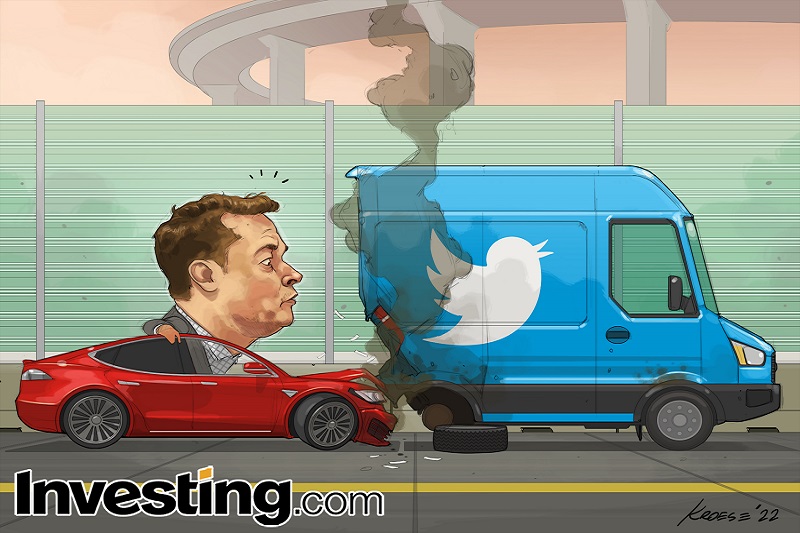By Geoffrey Smith
Investing.com -- Elon Musk’s acquisition of Twitter (NYSE:TWTR) could be the act that finally brings Tesla's (NASDAQ:TSLA) gravity-defying stock price down to earth.
For one thing, no amount of corporate finance jargon can mask the fact that Musk is selling one stock to buy another. The old rule - ‘if the guy who knows the business best is selling, do you really want to be buying?’ – still holds.
It certainly holds when you think that this is the second time in six months that Musk has taken money off the table, after selling more stock than he needed to last fall in order to pay his federal income tax bill. The stock, whose valuation defied gravity throughout the pandemic, hasn’t made a new high since the first of those sales.
The rule holds even more when one thinks of the potential that ownership of Twitter has for distracting Tesla’s CEO from his day job. Tesla is a company still in the relatively early stages of a multi-year expansion phase, with execution risks at every step of the way and with the company’s first-mover advantage being gradually eroded. The chance that Musk can manage Tesla (NASDAQ:TSLA) as well as before while trying to umpire disputes between the lunatic fringes of U.S. politics and stamping out Russian or Chinese disinformation is surely not very high.
Tesla has always had a high element of key person risk, and this move only exacerbates it. It is hard to see how owning Twitter makes his presence on the platform even more of an asset to Tesla’s general marketing, and only too easy to see how it could weaken it. Jeff Bezos' question about Chinese leverage over the company is to the point: what price free speech, if those running your biggest future market doesn't like it?
So what, says the fanbase. Elon has a history of multitasking. SpaceX, Neuralink, The Boring Company – none of these has stopped him delivering at Tesla. Why should Twitter?
The obvious answer is that none of the above comes anywhere close to the political sensitivity of a mass media platform, in a country that is never more than two years from elections. The second obvious answer is that Musk may struggle to turn around a company that has consistently struggled to turn a user base of hundreds of millions into money.
“I don’t care about the economics at all,” Musk told a recent TED event, as he talked up his vision of Twitter as a platform for free speech and robust debate. That’s the kind of talk that underpins his friendship with former CEO Jack Dorsey, who said “I trust his mission to extend the light of consciousness.” (Dorsey is one of a handful of large current shareholders that Musk reportedly wants to stay a co-owner after he takes Twitter private, reducing his own up-front costs.)
However, Dorsey himself failed to make that vision profitable, and Twitter needs, badly, to make money from day one. It will have to service over $13 billion in debt, directly or indirectly, due to the structure of the $44 billion deal, at a time when interest rates are rising steeply. For comparison, in the two years before the pandemic, the company made less than $400 million before earnings and taxes – not enough to cover one year’s worth of debt financing at 2%.
Another $12.5 billion of debt is a margin loan to Musk personally, secured against $62.5 billion of Tesla stock held by Musk. Both the terms of that loan and Tesla’s own internal guidelines limit the amount that Musk can borrow against his holdings at 20%. Given that over half of Musk’s 163 million shares are already pledged against other debt, Musk would have only limited ability to provide extra collateral should the value of Tesla’s shares fall sharply.
According to Bloomberg calculations, if the stock falls below $837 – only 8% below its current level – then Musk will have to raise cash to provide the extra collateral. As the vast bulk of Musk’s wealth is tied up in Tesla stock, that would most likely mean forced sales. Musk, meanwhile, will hope that the stock can hold above it until his next wave of options - worth as much as $23 billion under his 2018 compensation award - vests. While the company's first-quarter earnings appear to have triggered the release of most of those options, cashing in may be complicated if the company suffers a downturn and has to hand over those billions while its free shareholders suffer losses.
To be sure, most Wall Street analysts – let alone Tesla’s devoted base of retail investors - have target prices for the stock comfortably above that key $837 level.
Yet the reality is that, even after a 22% drop from its all-time high in April, the stock trades at 117 times trailing earnings, 10 times its expected sales for 2022 and, most strikingly, broadly equal in value to all the other household names in the global auto sector put together.
Such valuations tend not to outlive sharp monetary tightening cycles. Whatever the long-term outlook for Tesla, the short-term overhang looks decidedly dangerous.
